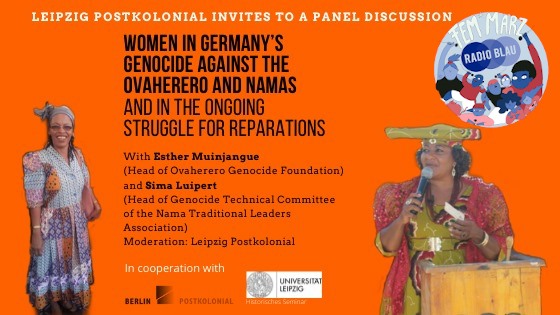Women in Germany’s genocide against the Ovaherero and Namas and in the ongoing struggle for reparations
with Esther Muinjangue and Sima Luipert (Namibia)
Moderation: Claudia Rauhut
19.12.2019, Ost-Passage Theater Leipzig
in Kooperation mit Berlin Postkolonial e.V., Historisches Seminar der Universität Leipzig und Rosa-Luxemburg-Stiftung
Germany’s colonial genocide 1904-08 in what is today Namibia affected not only the resistant men but also women and children who died of thirst in the Omaheke/Kalahari or were worked and tortured to death in concentration camps. The Ovaherero and Nama activists Esther Miunjangue (chair of the Ovaherero Genocide Foundation) and Sima Luipert (vice chair of the Genocide Technical Committee of the Nama Traditional Leaders Association) talk about women’s resistance and their continuing struggle for recognition of the genocide by the German government. They explain why the descendants of the communities directly affected by the genocide demand an official apology and reparations. With this event, Leipzig Postkolonial would like to contribute to a stronger public awareness of Germany’s colonial legacies, and of historical and political responsibility.

Flyer 
Podium 1 
Podium 2
©Fotos: Birgit Scheps-Bretschneider
Roundtable: Postcolonial reflections. On the future lives of objects
mit Dr. Wazi Apoh (University of Ghana / Department of Archeology and Heritage Studies, Legon), Stefanie Bach (GRASSI Museum für Völkerkunde zu Leipzig, Deutschland), Dr. El Hadji Malick Ndiaye (Université Cheikh Anta Diop de Dakar / Institut Fondamental d’Afrique Noire, Senegal), Greer Valley (Freie Künstlerin und Kuratorin aus Durban, Südafrika)
Moderation: Claudia Rauhut (AG Leipzig Postkolonial)
20.07.2019, GRASSI Museum für Völkerkunde zu Leipzig
Die Veranstaltung war Teil des internationalen Workshop “un_doingpost_colonialknowledges:perspectives from academia_arts_activism” (Bayreuth/Leipzig 18. – 21.07.2019) und fand in Kooperation mit dem Excellenzclusters „Africa Multiple“ der Universität Bayreuth und dem GRASSI Museums für Völkerkunde statt.
In den vergangenen Jahren ist das Bewusstsein dafür gewachsen, dass die Institution Museum auf einem schwierigen Erbe aufbaut. Viele Sammlungen sind durch koloniale Sammelpraktiken zustande gekommen und das Selbstverständnis des europäischen Museums beruht auf der problematischen Idee, die Welt ausstellen zu wollen. Das gilt in besonderem Maße für ethnologische Museen. Welche Schlüsse können wir daraus für die Zukunft ziehen? Wie soll die Zukunft von Museen und Objekten aussehen? Sollten Objekte zirkulieren? Wie kann ein internationaler Austausch zwischen Expert*innen auf Augenhöhe erreicht werden? Welche neuen Erzählweisen entwickeln Museen für ihre zukünftigen Ausstellungspraktiken? Diese Fragen diskutieren Wissenschaftler*innen und Kurator*innen vom afrikanischen Kontinent und aus Leipzig.
